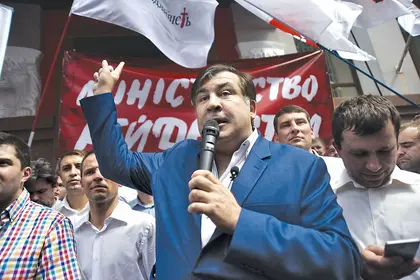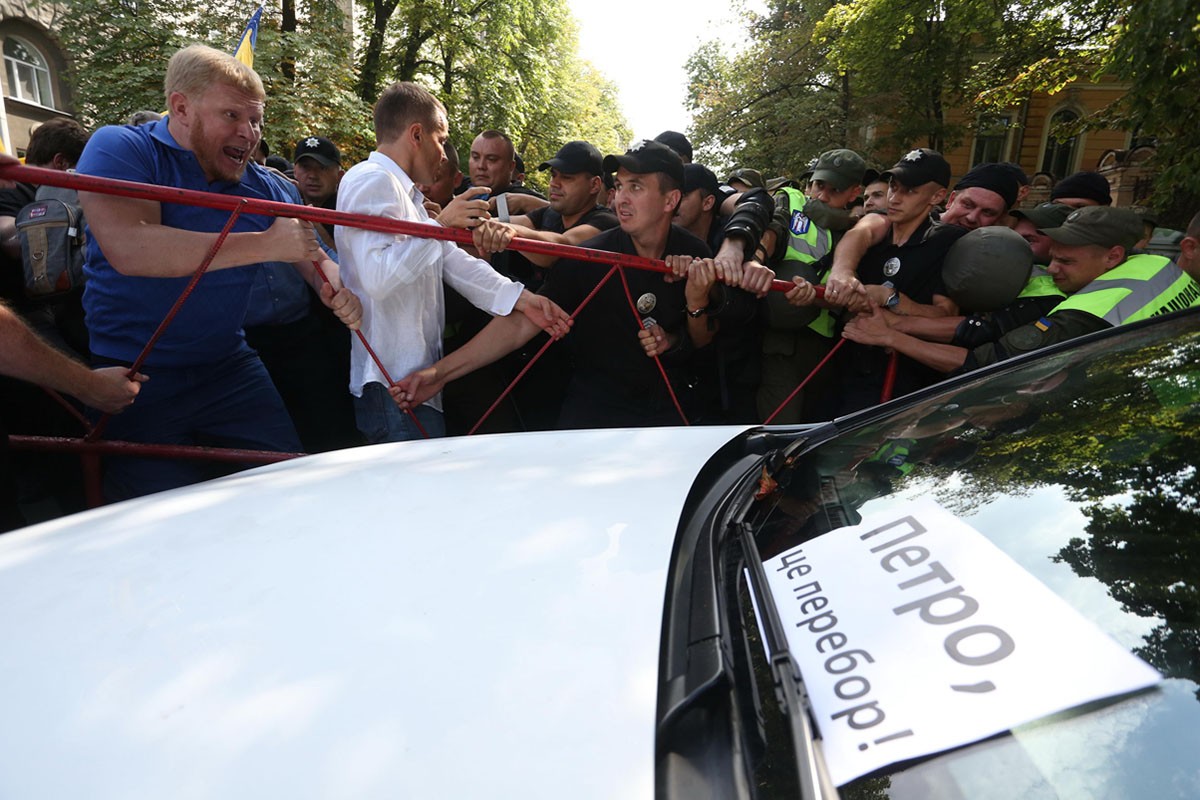President Petro Poroshenko on July 27 suspended the Ukrainian citizenship of ex-Georgian President Mikheil Saakashvili, dealing a blow to one of his major political opponents.
The president cited Saakashvili’s alleged legal violations when Poroshenko granted him Ukrainian citizenship in 2015.
But Poroshenko’s critics saw the motive as revenge for Saakashvili’s opposition activities and criticism of authorities. Poroshenko’s opponents accused the president of becoming more authoritarian and lawless.
“I have lived in Ukraine for more than 13 years, I participated in three revolutions. I have only one citizenship, that of Ukraine, and I will not be deprived of it!” Saakashvili said in a video statement on July 26. “I love Ukraine with my whole heart and I will continue the fight here in our Ukraine regardless of any obstacles!”
Reactions
Lviv Mayor Andriy Sadovyi denounced the decision.
“Stripping the citizenship of a politician with a worldwide reputation, who after two terms as Georgian president agreed to be a governor in Ukraine, only because he became an opponent — this is the peak of political fear,” Sadovyi wrote on Facebook.
Mustafa Nayyem, a lawmaker with Poroshenko’s Bloc, called it “the silliest move possible, a sign of weakness.” Nayyem compared it to then-President Viktor Yanukovych’s imprisonment of his top opponent, ex-Prime Minister Yulia Tymoshenko, in 2011.
Tymoshenko, released after the Yanukovych regime was overthrown in February 2014, called Poroshenko’s move “an attempt to set up a dictatorship by destroying political opponents.”
Even billionaire oligarch Ihor Kolomoisky, an opponent of Saakashvili, spoke against the president’s move.
“Stripping Saakashvili of citizenship is a shameful stain on the reputation of our country,” Kolomoisky said to TSN, a news website that he owns. “It’s even more shameful that despite our European aspirations, it was done in a Soviet tradition.”
Shady decree
On July 24, Poroshenko reshuffled the Commission on Citizenship in what critics saw as preparation for the suspension of Saakashvili’s citizenship. He appointed three new members on the 15-member commission, including Oleksiy Takhtai, the Interior Ministry’s state secretary.
A person who resembles Takhtai features in video footage of negotiations on a corrupt deal at the Interior Ministry leaked in 2015. He denies the accusations.
Poroshenko’s deputy chief of staff Oleksiy Dniprov is a deputy head of the commission. Poroshenko has ignored the obligation to fire him under the 2014 lustration law on the dismissal of top Yanukovych-era officials, according to the Justice Ministry.
The announcement on the suspension of Saakashvili’s citizenship was made in a bizarre way. It was first made unofficially by lawmaker Igor Mosiychuk on July 26, and then the State Migration Service made an unclear statement indirectly confirming it before denying the suspension. The Presidential Administration refused to comment for many hours until July 27.
The State Migration Service submitted evidence that Saakashvili had given incorrect information when he applied for citizenship in 2015, Presidential Administration spokesman Yarema Dukh said on July 27. The newly reconstituted Commission on Citizenship approved suspending his citizenship, he added. Under the law on the protection of personal data, the decree cannot be published because it contains confidential information, he said.
Dukh would not say what incorrect information Saakashvili allegedly submitted.
Unconstitutional?
Yulia Kyrychenko, a constitutional law expert at the Reanimation Package of Reforms, and Vsevolod Rechytsky from the Kharkiv Human Rights Group said that the refusal to publish a presidential decree is illegal.
Also, the Constitution bans authorities from stripping anyone of citizenship — a measure intended to prevent the resurrection of the Soviet practice when dissidents were deprived of their citizen status.
However, lawyers differ on whether this ban also applies to suspension. No president had previously applied this measure to his opponents.
Kyrychenko and Olga Poyedinok, an international law expert at Kyiv National University, argue that the constitutional ban does not apply to suspension.
But Rechytsky and Yevhen Zakharov from the Kharkiv Human Rights Group believe that suspending Ukrainian citizenship violates the Constitution since suspension is tantamount to being deprived of citizenship. Viktor Musiyaka, a legal scholar, thinks that a suspension can be challenged in court.
Poroshenko’s critics also argue that the suspension of Saakashvili’s citizenship is clearly political.
In April, Poroshenko also suspended the Ukrainian citizenship of Sasha Borovik, an ally of Saakashvili and a critic of the president, and Radical Party lawmaker Andriy Artemenko, because they allegedly have German and Canadian citizenships, respectively.
Poroshenko has been accused of using a politicized selective approach since he did not suspend the citizenship of State Fiscal Service Chief Roman Nasirov, a suspect in a corruption case who is a citizen of the United Kingdom. He also took no action against Kremlin-backed separatists and allies of ex-President Viktor Yanukovych who fled to Russia, including those who got Russian citizenship. Under Ukrainian law, double citizenship is banned but the prohibition is widely ignored.
Extradition
Saakashvili went to the United States early this week and is planning to return, his spokeswoman Daryna Chyzh said, but did not say when.
Since Saakashvili is not a Ukrainian citizen anymore, authorities may refuse him entry. Saakashvili will also be banned from holding government office in Ukraine and taking part in elections. He had been gearing up for the 2019 elections, when Ukraine will choose a president and parliament.
Saakashvili also faces criminal charges in Georgia and was stripped of Georgian citizenship in 2015, which makes him a stateless person now. Ukrainian law says that a stateless person who “permanently resides in Ukraine” and commits a crime outside Ukraine may not be extradited. However, Ukrainian authorities may argue that Saakashvili no longer has permanent resident status and extradite him.
Ukrainian lawyer Andriy Tsygankov said that there are grounds for Saakashvili’s extradition because official requests were received by the Prosecutor General’s Office that indicate Saakashvili is charged with a crime in Georgia.
Under the European Convention on Nationality, which has been signed and ratified by Ukraine, a person cannot be stripped of citizenship if he becomes stateless as a result. However, Poroshenko used the only loophole in the convention – the exemption according to which this clause does not apply to people who got their citizenship by submitting incorrect data.
Saakashvili’s wife, Sandra Roelofs, a Georgian politician, is a citizen of the Netherlands by birth. It gives him right to apply for a residence permit there, but it doesn’t mean he’d be safe from extradition.
In an interview published by Novoe Vremya magazine on July 26, Saakashvili said that he would stay in Kyiv even without a Ukrainian passport.
Georgian charges
Georgian authorities have charged Saakashvili with embezzlement of public funds — something Saakashvili calls a political vendetta by his enemy, Georgian tycoon and politician Bidzina Ivanishvili.
“For four years, there have been criminal cases opened against me in Georgia,” Saakashvili was quoted as telling NewsOne TV channel in Kyiv. “They have considered all the expenses of the presidential office to be embezzlement of state funds. They took into account some banquets, my four suits and one coat that I bought for official events.”
Georgia has also accused Saakashvili of abuse of power during a crackdown on demonstrators in 2007 and Georgia’s opposition Imedi TV channel. He is also accused of ordering an attack on lawmaker Valery Gelashvili.
In June 2014, the Tbilisi City Court authorized a trial in absentia for Saakashvili. He moved to Ukraine after he left the presidency in Georgia in 2013 after serving two terms.
In 2015 Ukrainian prosecutors refused to extradite Saakashvili to Georgia because they interpreted the cases against him as political persecution.
Poroshenko’s official visit to Georgia on July 17–19 is seen an effort to improve bilateral relations and reverse Ukraine’s policy of not extraditing Saakashvili.
After Poroshenko’s visit, Radical Party lawmaker Andriy Lozovy filed a request to the General Prosecutor’s Office on July 20, asking to confirm whether they have received extradition requests from Georgian counterparts.
In a video address that appeared online on July 26, Saakashvili said that the decision to suspend his Ukrainian citizenship came after agreements between the “oligarch clans” of Poroshenko and Ivanishvili.
“They came up with the idea that the Prosecutor General’s Office would provide new evidence in my case — this is another lie,” Saakashvili said in the video.
Rival party
Saakashvili’s troubles with Ukrainian authorities began after he stepped down as governor of Odesa Oblast last November and launched the Movement of New Forces in February. He also became the anchor of a television show highly critical of Poroshenko on ZIK TV channel in March.
In May a rival party was renamed to the Mikheil Saakashvili Bloc in what the ex-Georgian president interpreted as an effort by Poroshenko to take away his votes. The Presidential Administration denied the accusations.
The movement merged with the Volya party in April and created an opposition coalition with the parties of lawmaker Viktor Chumak, ex-Security Service Chief Valentyn Nalyvaichenko and ex-lawmaker Egor Firsov in July. Saakashvili has also been in talks with the Democratic Alliance and Samopomich parties.
Other crackdowns
Saakashvili is not the only opposition politician who has been targeted.
Critics of Poroshenko have faced criminal cases that they believe to be fabricated. These include ex-deputy prosecutor generals Vitaly Kasko and Davit Sakvarelidze, ex-reformist customs official Yulia Marushevska, National Anti-Corruption Bureau of Ukraine deputy chief Gizo Uglava and lawmaker Leshchenko.
Poroshenko has also been accused of cracking down on free speech, which he denies. The authorities have been reluctant to extend the licenses of Channel 112 and 1+1, initiated a criminal case against TV journalist Savik Shuster, banned Russia’s Dozhd TV channel and stripped Ukraine’s Radio Vesti of its license.
In March, Poroshenko also signed into law a measure that sets the same asset disclosure requirements for anti-corruption activists as for government officials.
Mikheil Saakashvili’s path
Early years
1967 — Born in Tbilisi, Georgia.
1992 — Graduates from the National University of Taras Shevchenko in Kyiv; future Ukrainian President Petro Poroshenko is among his classmates.
Life abroad
1992–1993 — Studies in Strasbourg, France; meets Sandra Roelofs, a fellow student and citizen of the Netherlands. They marry in 1993.
1993–1994 — Studies at Columbia University in New York and graduates with a master of law degree.
1995 — Admitted to the New York State Bar Association and practices commercial law with Patterson Belknap Webb & Tyler in New York City.
Back in Georgia
1995 — Saakashvili returns to Georgia and gets elected to parliament with the Union of Georgian Citizens, a pro-presidential party. In 1998, Saakashvili becomes party leader.
2000 — Becomes minister of justice.
2001 — Quits government, accusing then-President Eduard Shevardnadze of corruption; starts an opposition party.
2003 — Leads Rose Revolution against unfair parliamentary elections.
2004 — Gets elected as president of Georgia with 96.2 percent of votes.
2007 — Forcefully disperses an opposition protest and calls for early elections.
2008 — Wins with 53.5 percent of votes; five-day Russian-Georgian War takes place as Georgia loses control of South Ossetia and Abkhazia.
November 2013 — Leaves presidency after two terms and accepts a teaching job at Tufts University in the United States.
2014 — Georgian authorities launch criminal investigations against him for abuse of office and embezzlement. He refuses moves to Ukraine.
In Ukraine
February 2015 — Becomes an adviser to Poroshenko as Ukraine refuses to extradite Saakashvili to Georgia.
May 2015 — Poroshenko appoints Saakashvili as governor of Odesa Oblast and grants him Ukrainian citizenship.
December 2015 — Gets into public quarrel with Interior Minister Arsen Avakov and then-Prime Minister Arseniy Yatsenyuk during a meeting of the National Reforms Council.
November 2016 — Quits the governor’s job, alleging obstruction by Kyiv of his anti-corruption drive.
February 2017 — Saakashvili registers the Movement of New Forces political party.
July 26, 2017 — Poroshenko strips Saakashvili of Ukrainian citizenship for allegedly lying on his citizenship application.
You can also highlight the text and press Ctrl + Enter





